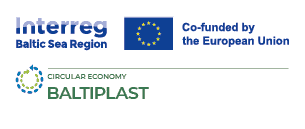
How BALTIPLAST Solutions Are Changing the Future of Plastic Waste
17 November 2025
The BALTIPLAST project is proving just that, with technical and technological pilots across Lithuania, Latvia, and Estonia that show how smart collection, sorting, and recycling can cut pollution and fuel a circular economy.
Smarter Collection Systems
The first step to better recycling is better collection. BALTIPLAST compared mixed waste collection (where plastics are thrown in with household waste) and separate plastic collection (dedicated bins or bags). The verdict is clear: separating plastics at the source leads to higher-quality recycling and less pollution.
Learn more about the benefits of separate plastic collection.
High-Tech Sorting with NIR Spectroscopy
Sorting plastics by hand is slow and often inaccurate. Using TrinamiX Near-Infrared (NIR) spectroscopy—a handheld scanner that can identify plastics in seconds, even telling apart very similar polymers like high-density polyethylene (HDPE) and low-density polyethylene (LDPE). This means cleaner recycling streams and less waste ending up in landfills or incinerators.
Explore the TrinamiX tool.
A Protocol for Clean Data
BALTIPLAST piloted a step-by-step sorting protocol in Kaunas (LT), Daugavpils (LV), and Tallinn (EE). By collecting, scanning, and weighing samples from households, the project built reliable local data on plastic waste composition. This data helps municipalities design smarter recycling systems tailored to their citizens’ habits.
See the case study results.
Closing the Loop: Innovation in Action
The pilots also showed how plastics can be reborn into valuable products:
- From plastic to biodegradable packaging: Ecomyco uses fungal enzymes to turn plastics into insulation and eco-friendly materials.
- From plastic to pavements: Plastteed creates modular walkways and bike paths from recycled plastics, reducing CO₂ emissions while building greener cities.
Learn more about Ecomyco’s approach
Discover Plastteed’s recycled roads.
Why This Matters
The BALTIPLAST pilots prove that with better collection, smart sorting, and creative recycling, plastic waste can be turned into an opportunity. Municipalities, businesses, and citizens all have a role to play. Together, they can close the loop, making plastic part of a sustainable future instead of a growing problem.
Read more about the project: BALTIPLAST on Interreg Baltic Sea Region.





